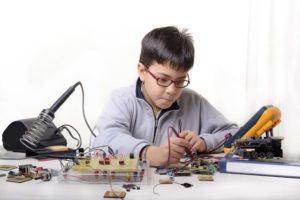How do parents prepare their kids for future job opportunities?
 There is no doubt that STEM skills (science, technology, engineering and math) will factor heavily into the job market of tomorrow. And right now, the U.S. educational system is behind the curve. Employers have more openings than skilled workers and there’s a shortage of skilled teachers. Recently, a panel for the Milken Institute talked about how to bridge that gap and discussed a future where 1.4 million STEM jobs will need to be filled in the next five years, but only 16 percent of high school students are interested in these fields. Though the panelists discussed big picture, 10,000-foot vantage point solutions, their insights are actually instructive about what parents can do today to prepare their kids for the future. Based on that hour-long discussion, here are three things for parents to consider.
There is no doubt that STEM skills (science, technology, engineering and math) will factor heavily into the job market of tomorrow. And right now, the U.S. educational system is behind the curve. Employers have more openings than skilled workers and there’s a shortage of skilled teachers. Recently, a panel for the Milken Institute talked about how to bridge that gap and discussed a future where 1.4 million STEM jobs will need to be filled in the next five years, but only 16 percent of high school students are interested in these fields. Though the panelists discussed big picture, 10,000-foot vantage point solutions, their insights are actually instructive about what parents can do today to prepare their kids for the future. Based on that hour-long discussion, here are three things for parents to consider.
After-school programs offer unique learning opportunities
During school, a child is an involuntary captive audience. After school, however, the “balance of power switches,” because the child gets to opt into an after-school program they want to be part of, says Brent Bushnell, CEO of Los Angeles based Two Bit Circus, a company that makes products and events that combine story and technology. This allows the child to see an abstract concept they learned in a classroom become real and relevant.
The takeaway here is that hands-on after-school programs which encourage inventing or building, whether it’s out of robot parts or LEGO Bricks, will give kids an early introduction to STEM skills with hands-on activities such as fabricating, inventing, programming, measuring, designing and testing. When kids make meaningful connections with what they have learned, learning improves.
 Girls are underrepresented in STEM careers
Girls are underrepresented in STEM careers
Children are often interested in science throughout their elementary school years. But something happens to girls in middle school. Their interest in science and math drops off considerably. Women are well-represented in the fields of medical and chemical science, but too few of them pursue technology careers, says Kimberly Bryant, founder and executive director of Black Girls Code. In junior high, girls become aware of the many pressures to live up to, and sadly, society, teachers and even parents discourage girls from pursuing technology careers, she says.
Writing and communication skills are also valuable
It’s not enough to be proficient in calculus by the age of 15, or a tech wiz who can design million-dollar apps. STEM skills are important in the workplace of tomorrow, but the panelists agree jobs in the future will need these three skills: problem-solving, writing and presentation. These are all about having the ability to communicate in a way that is both compelling and clear, both in writing and in person, along with having a flexible, nimble mind that can adapt to change and identify possibilities. From an early age, encourage your children to think through problems and come up with their own solutions.
Our Valued Customers
"My son learned how to make his favorite dinosaur as a LEGO® robot at a party! He loves to go to Bricks 4 Kidz after-school classes now"
— Miranda K.Jacksonville, FL